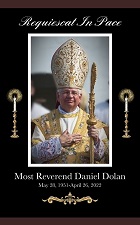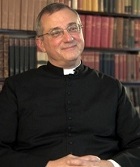A certain anti-Catholic sect, previously written about in the articles called "The Papacy and the Papal States", “God is the Father of all men”, and “WHO MAY PREACH”, is spreading lies about two Popes - Leo XIII and St. Pius X.
The sect falsely declares that both Popes were “heretics”. According to sectarians the “heresy” was that Popes - Leo XIII and St. Pius X believed in “God the Father of all”, and that only these two Popes began to preach such a "heresy", and that before them there had not been belief in God as the Father of all men.
Here an Official Catholic Church Teaching follows, by which allegations and insults, addressed to Pope Leo XIII and Pope St. Pius X are totally exposed and refuted:
CATECHISM OF PERSEVERANCE
AN HISTORICAL, Doctrinal, Moral and Liturgical
EXPOSITION OF THE CATHOLIC RELIGION
BY REV. F. B. JAMISON:
CHAPTER XVIII.
Union of our intellect with our Lord, the new Adam, by faith. - First and second articles of the Symbol.
Q. Why is God called Father?
A. He is called Father: 1st, because from all eternity he begot his Son, and because he is the principle of all that exists; 2d, because he has created us; 3d, because he has adopted us, in our Lord, as his children. (pp. 163, 164) (1)
CHAPTER XXV.
Of our union with our Lord, the new Adam, by charity. Charity - The Decalogue.
Q. What is the second object of charity?
A. The second object of charity, is our neighbor; that is, all men, without exception; Christians, Jews, idolaters, and even our enemies.
Q. Why must we love our neighbor?
A. We must love our neighbor because God wills it; 1st, because all men are, like ourselves, created to his image; 2d, because all men are our brothers in the first and second Adam; 3d, because all men have been redeemed by the blood of Jesus Christ, and are all destined for the same happiness; 4th, because the end of religion is to destroy self-love, which had seized upon the heart of man since the commission of original sin, and substitute universal charity, which should make mankind one family of brothers.
Q. How should we love our neighbor?
A. We should love him as God loves him; with a universal, generous, constant, and holy or supernatural love.
Q. What is meant by the words to love our neighbor for God's sake?
A. It means that we must love our neighbor with a view to his eternal salvation, and also to please and obey God.
Q. What do you observe on this subject?
A. I observe that it is impossible to give our charity a more solid foundation. Since God is infinitely amiable, our love for our neighbor should never be false to itself, whatever the injuries we may receive.
Q. What is the end proposed by the decalogue?
A. The end proposed by the decalogue, is to aid us in keeping the great commandment of the love of God and of our neighbor; for our Lord has said that in this commandment all the rest are contained. (177, 178) (1)
CATECHISM DOCTRINAL, MORAL, HISTORICAL, AND LITURGICAL
BY THE REV. PATRICK POWER:
Q. And who is my neighbour? - Luke, x. 29.
A. Mankind of every description; and without any exception of persons, even those who injure us, or differ from us in religion.
7. As the catechism tells us, dear children, our neighbour is "mankind of every description" – all men in general, because all men, equally as ourselves, have been created to the image of God, and redeemed by the precious blood of Jesus Christ. By our "neighbour" we are not to understand merely our parents, our friends, our benefactors, those who live in the same city or town with us, or those who profess the same religion with us. No, not those alone; but "neighbour", in the Gospel sense, means all men, without exception of persons or distinction of creed - strangers equally as fellow-countrymen, heretics, sunk deep in error, equally as Christians enlightened with the light of the true faith – Jews and idolators - our enemies as well as our friends. Our "neighbour" comprises all men; for all men are children of the same God, and the Lord sheds His favours and benefits on all. For the wicked, equally as the just, the dew renders the earth fruitful for the wicked, as well as the good, the sun glows in the firmament, and diffuses heat and light over the world; for such is the will of our Father in Heaven. (pp. 5, 6) (2)
Q. Whom do you call "Our Father", when you say the Lord's Prayer?
A. Almighty God, who is the common Father of all.
2. This most endearing title of "Father" is placed in the very beginning of this prayer, rather than that of King, Lord, or Sovereign. "Almighty God" we call by "Our Father", for He "is the common Father of all". (p. 121) (2)
Conclusions:
- The teaching of Pope Leo XIII and Pope St. Pius X that God the Father is the Father of all men is based on the solid foundation of the Holy Bible and fully corresponds to the Catholic Catechisms published in 1849 and 1864, during the reign of Pope PIUS IX.
- Based on the aforementioned two Catholic Catechisms one can conclude that private interpretations of the sectarians are false and contradicting to Holy Bible and Holy Tradition of the Catholic Church.
- The baseless allegations of heresy, addressed to the Popes by the sect, actually show us, that the sect itself is heretical, dishonest, and, therefore, has nothing common with the Catholic Church.
- If the members of the sect claim to be defenders of the justice and Catholic Faith, in conscience they are obliged to abandon their false belief, to make a public apology for all insults addressed to the Roman Pontiffs, make an act of perfect contrition, confess their sin before a Catholic priest in prescribed by the Church manner, and to do penance.
- However, if until this moment, they sinned "in good faith", without having the fullness of knowledge, since the moment knowing the truth they are obliged to correct their very grave error in public manner and stop slandering the Vicars of Christ.
Fr. Valerii
References:
(1) CATECHISM OF PERSEVERANCE
AN HISTORICAL, Doctrinal, Moral and Liturgical
EXPOSITION OF THE CATHOLIC RELIGION
FROM THE FRENCH OF ABBE GAUME.
BY REV. F. B. JAMISON
FROM THE FIFTH PARIS EDITION.
BALTIMORE:
PUBLISHED BY P. J.HEDIAN & CO
No. 2 North Gay street.
1849.
pp. 163, 164, 177, 178
APPROBATION.
I cheerfully recommend to the patronage of the Catholic community the Catechism of Perseverance, translated from the "Petit Catechisme de Perseverance," of the Abbe Gaume, as a work well calculated to impart solid historical, liturgical, moral and doctrinal instruction in an agreeable form, and as being particularly well suited for the purpose of higher religious instruction in Catholic schools and academies.
+ Martin J. Bishop of Lengone and Coadjutor Bishop of Louisville.
Louisville, April 25, 1849.
Although I have not read the translation of the abridgment of the "Catechism of Perseverance," I cheerfully recommend it to the faithful on the ample guarantee of the approbation of the Rt. Rev. Dr. Spalding.
+ Samuel, Archbishop of Baltimore,
Baltimore, August 23, 1849.
We cheerfully concur in the approbation given above by the Rt. Rev. Bishop Spalding.
+ Michael, Bishop of Mobile,
+ Anthony, Bishop of New Orleans.
+ John, Bishop of Galveston.
(2) CATECHISM DOCTRINAL, MORAL, HISTORICAL, AND LITURGICAL
BY THE REV. PATRICK POWER
WITH EPISCOPAL APPROBATION
IN THREE VOLUMES,
VOL. III
EIGHTH EDITION.
ENLARGED AND IMPROVED.
DUBLIN: JAMES DUFFY AND CO., LIMITED
LONDON: BURNS AND OATES.
pp. 5, 6, 121
APPROBATIONS of 19 Bishops:
By the RIGHT REV. L. GILLOOLY.
Sligo. Dec. 2nd, 1864.
REV. DEAR SIR - I have read your Catechism, now complete in three volumes, and it gives me great pleasure to unite with the many learned prelates who have already commended this most useful work, in congratulating you on the great service you have rendered by its publication to our clergy and laity. The zeal that prompted you to undertake, and still more the untiring industry with which, in the midst of your missionary duties, you pursued and completed it, deserve much praise indeed, and will, I trust, stimulate other good and gifted priests, similarly engaged in parochial labours, to persevere in the ecclesiastical studies commenced in college, and publish the result of their labours for the instruction and edification of the faithful. I hope your Catechism will be extensively read. I will not fail to recommend it to the priests, and through them to the Catholic laity of this diocese.
I remain dear, Rev. Dear Sir, yours faithfully in Christ,
+ L. GlLLOOLY.
By the RIGHT REV. FRANCIS KELLY.
Moville, Dec;. 2nd, 1864.
REV. DEAR SIR - I shall feel much pleasure in recommending to the clergy and faithful of Derry your excellent "Catechism: Doctrinal, Moral, Historical, and Liturgical", published with the permission of your venerable Bishop.
I remain, Rev. Dear Sir, yours faithfully in Christ,
+ FRANCIS KELLY.
By the RIGHT REV. JAMES WALSHE.
Carlow, Dec. 3rd, 1864.
DEAR REV. SIR - I cordially concur in the approval bestowed by so many eminent prelates upon the "Catechism Doctrinal, Moral, Historical, and Liturgical". I shall have great pleasure in recommending your highly useful work to the faithful of this diocese.
I am, dear Rev. Sir, yours faithfully in Christ,
+ JAMES WALSHE
By the RIGHT REV. GEORGE BUTLER.
Park House, Limerick, Dec. 7, 1864.
MY DEAR REV. SIR - I consider your Catechism a most valuable repertory of sound doctrinal and moral teaching, and I shall count it a duty, as occasion may offer, to recommend it strongly to the clergy and laity of this diocese. Believe me, my Dear Rev. Sir, most faithfully yours in Christ,
+ GEORGE BUTLER, Bishop of Limerick.
|

